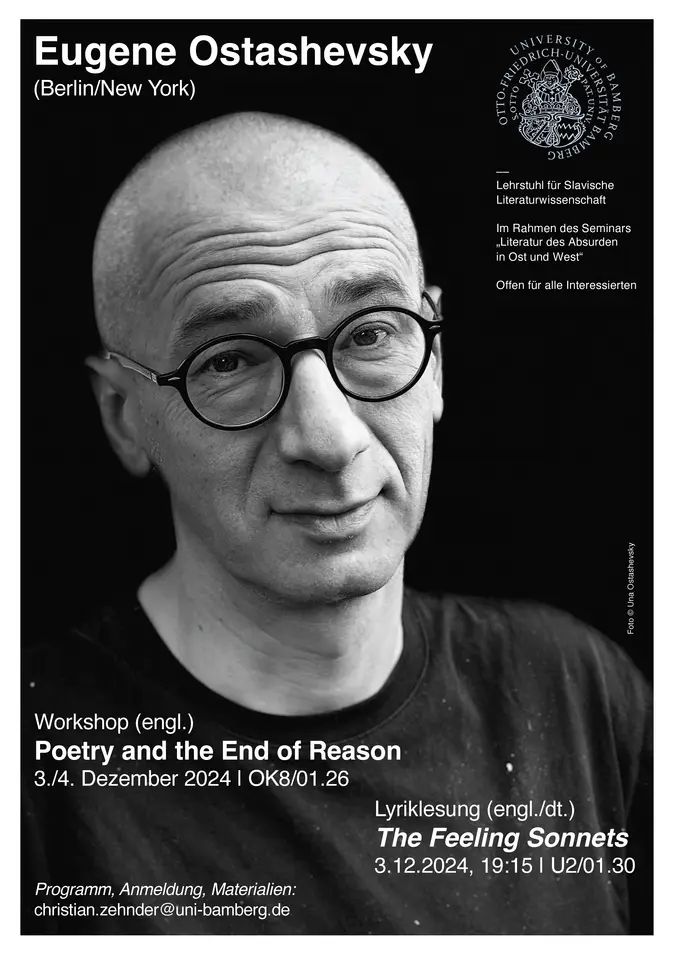Workshop and Poetry Reading: Eugene Ostashevsky (New York University) in Bamberg (3./4.12.2024)
Der Lehrstuhl für Slavische Literaturwissenschaft pr?sentiert:
***
Dienstag/Mittwoch, 3./4. Dezember 2024 | Obere Karolinenstra?e 8 (OK8/01.26)
Workshop mit Prof. Eugene Ostashevsky (New York University)
Avant-Garde Poetics and the End of Reason
This workshop will focus on the critique of rationality and causation in avant-garde art and literature, and especially in the post-Futurist underground circle around the poets Daniil Kharms and Alexander Vvedensky in 1930s Leningrad (known as OBERIU). Nineteenth-century European humanism favored rationalist models of development, which were expressed in novels like the Bildungsroman, where prior events shaped posterior events, and where objects were classified according to their putative origins. By contrast, twentieth-century avant-garde art was interested in what the Futurists called “simultaneity” (Gleichzeitigkeit), which was roughly equivalent to Cubist collage and cinematic montage. Simultaneity focused on the synchronic at the expense of the diachronic. It bracketed origins and denied determinism. It broke down borders by bringing together objects ripped out from their rational, natural contexts, and studied the way their juxtapositions generated a new meaning in their new, arbitrary context. It was the art of the new mass society: the society of industrial and social revolutions, which was anti-humanist in that it denied individuals’ mastery over their fates.
The main reading materials for the workshop will include the often very funny work of OBERIU (sometimes described as the Russian literature of the absurd), which breaks down the realist conventions of narrative, character, causation, and inference, critiquing the supposedly necessary relationship between the before and the after.
Eugene Ostashevsky’s poetry books include: The Feeling Sonnets (NYRB Poets, 2022); The Pirate Who Does Not Know the Value of Pi (NYRB Poets, 2017); and The Life and Opinions of DJ Spinoza (Ugly Duckling 188bet亚洲体育备用_188体育平台-投注*官网, 2008). His translations include F Letter: New Russian Feminist Poetry, trans. With Galina Rumba and Ainsley Morse (ISOLARII, 2020); Alexander Vvedensky, An Invitation for Me to Think (NYRB Poets, 2013; Winner of National Translation Award, 2014); OBERIU: An Anthology of Russian Absurdism, ed.; trans. with Matvei Yankelevich (Northwestern University Press, 2006).
Die Unterrichtssprache ist grunds?tzlich Englisch. Es ist allerdings auch m?glich, sich deutsch oder russisch zu ?u?ern.
Programm
3. Dezember:
DIENSTAGVORMITTAG (9:15–12:00): FUTURISMUS (Scherstjanoi & Marinetti)
DIENSTAGNACHMITTAG (14:15–17:00): OBERIU I (Charms & Vvedenskij)
4. Dezember:
MITTWOCHVORMITTAG (9:15–12:00): OBERIU II (Vvedenskij & Zabolockij/Druskin)
MITTWOCHNACHMITTAG (14:15–17:00): GEGENWART (Belorusets)
? Anmeldung und Materialien (orig. und in eng. und dt. ?bersetzungen): christian.zehnder(at)uni-bamberg.de oder direkt über den VC-Kurs ?Literatur des Absurden in Ost und West – Geschichte und Gegenwart"
Es ist auch eine partielle Teilnahme m?glich, also z.B. 2 bis 3 Module statt alle 4 zu besuchen.
***
Dienstag, 3.12.2024, 19:15 | U2/01.30 (An der Universit?t 2)
Lyriklesung mit Eugene Ostashevsky
Mehrsprachige Lesung aus seinem Lyrikband The Feeling Sonnets (New York Review Books, 2022) mit Gespr?ch. Moderation: Christian Zehnder
Lyn Hejinian über The Feeling Sonnets:
“Feelings proliferate in The Feeling Sonnets, and first among them is the feeling that we have to ask what we mean by feeling. It is to feel his way toward an answer to that primary question that the brilliant poet Eugene Ostashevsky has written this collection of vivacious, witty, and anguished poems. As the poems unfold, language gets caught up in proliferative play. The poet flounders through fields of feeling, one felt word spilling out of another, one spelt word spelling another. Feeling moves from one cultural or linguistic context to another, doubling and redoubling the potential for meaning and the potency of meaning’s prolific uncertainty and occasional absurdity. And extending through the linguistic microsystem of vowels and consonants that shift meanings from place and place (and even nation to nation) is the exquisite sensibility of a poet, erudite, humble, and closely watching over those he loves. This is an extraordinary and beautiful book.”
Beide Veranstaltungen sind offen für alle Interessierten!

